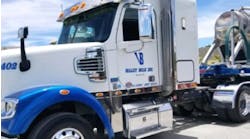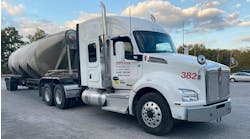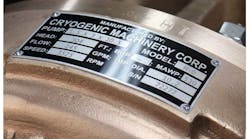BeyondTrucks expands integration hub
PSG acquires cryogenic pump manufacturer
Tandet Logistics claims top honors for outstanding safety performance across the United States and Canada
FOR years, Tandet Logistics Inc has been recognized as one of the safest tank truck carriers in Canada. Now the company also has garnered top safety honors in the United States.
Tandet Logistics recently received its first National Tank Truck Carriers Outstanding Safety Performance Trophy in the Sutherland Division for carriers below 15 million miles. The Oakville, Ontario, carrier also received the Grand Award in the 5-7 million milers class of the Competitive Safety Contest with an accident frequency of just .150 for calendar year 2018. In addition, it earned a Grand Award in the Personnel Safety Contest for zero lost-time injuries in 2018.
Dave Herdman, safety and training supervisor for Tandet Logistics, was named NTTC Safety Professional of the Year in the Sutherland Division.
“Winning this trophy was a humbling experience,” says Scott Tilley, president of Tandet Logistics. “We knew we had a good safety program, but it means a great deal to be recognized for our achievements in front of our peers in the industry.
“Safety is a part of this company’s DNA and always has been. The focus on safety definitely helped us build a successful operation as a transporter of liquid and dry bulk cargoes over our 42-year history.
“We have a staff of six safety professionals who focus on drivers, operations, and road safety. Our training regimen is strict and required drivers to learn the Tandet way on how we safely operate, interact with our customers (and their customers), and the public at large.”
Nice feather
Herdman adds: “The award was a nice feather in our cap. We begin every year with goals that include being a safe and profitable carrier. It offers verification that we are doing the right things. We want more verification in the future, because we want to win this trophy again.”
The NTTC Outstanding Safety Performance Trophy joins numerous safety awards the fleet has garnered in Canada and the United States. These include a 1992 Award for Excellence by a trucking fleet from the Ontario Ministry of Transportation and a 1997 National Fleet Safety Award from the Canadian Trucking Association in the 3-18 million miles category. The carrier also earned Grand Awards in NTTC’s Competitive Safety Contest in 2005, 2008, 2011, and 2017.
“We joined NTTC in the early 2000s, and we began participating in the safety competition almost immediately,” Tilley says.
Tandet Logistics is one of three operations that make up the trucking side of Tandet Group, the others being Tandet Dedicated and Connell Transport International. Tandet Logistics and Connell Transport International focus on tank truck operations, Tandet Dedicated focuses on more diverse freight.
Tilley suggests that Tandet may combine all of three trucking units into a single entity. “It would be interesting to see if we could become the first tank truck carrier to win the NTTC Outstanding Safety Performance Trophy in both mileage divisions,” he says.
Leasing origin
Vehicle leasing gave the company its start with the acquisition of Oakville Drive Yourself Ltd in 1977. Starting with 10 rental cars, 18 rental trucks, and 30 full-service lease vehicles, the company had grown into a decent size as a regional operator with six locations serving customers in Ontario, Quebec, and the Maritime Provinces. The lease and rental fleet had reached about 500 vehicles when the Tandet Group pulled out of leasing in 2014.
In 1987, the company made its first foray into trucking with an initial focus on less-than-truckload operations. The freight and flatbed operation was based in Gormley, Ontario. The LTL operation was sold in 2000.
Tandet’s move into tank truck operations started in 1991 when the company’s largest lease customer—Imperial Oil (Exxon)—announced that it was going to stop running its own private fleet for solvents. Imperial Oil was running 35 transports at the time.
“We acquired their driver pool in London, Ontario, and Tandet Logistics was up and running,” Tilley says. “In addition to hauling solvents in tanks, we added dry bulkers for plastic pellets.
“The transition into tank fleet operations was smooth and relatively seamless. We were comfortable with the risk factors, and we already had a strong focus on safety.”
Liquid operations
Today, Tandet Logistics accounts for about 30% of the trucking activity in the Tandet Group. The fleet runs just under 100 tractors—company owned and owner-operator.
Tandet Logistics serves customers across North America. The fleet operates from Ontario locations in Oakville, Sarnia, Hamilton, and Mississauga. For western customers, the carrier has two locations in Winnipeg, Manitoba.
More than half of the loads hauled by Tandet Logistics go from Canadian manufactures to US customers, and the carrier covers 70% of the United States. Most Canada-bound US loads come from the Gulf Coast, North East, and Midwest.
“Our core areas are in Ontario, Quebec, western Canada, the Great Lakes US region, the US Midwest, and southern US points including Texas and Louisiana,” Tilley says. “Most of our Canadian customers ship south into the United States, and our fleet spends 80% of hours and miles in the United States. We are very reliant on US activity.”
Across all of the Tandet trucking operations, the company handles a broad range of products. “We haul most liquid commodities that travel well in stainless steel tanks,” Tilley says. “We also handle hot products, including tar, asphalt, pitch, and sealers in insulated aluminum and steel units. In addition, we’re permitted for waste products.”
Driver team
A team of more than 200 drivers keeps loads moving across the Tandet Group. The group also employs 10 dispatchers and more than 25 mechanics/technicians in their five shop locations.
Company drivers predominate, but the Tandet Logistics has been bringing on more owner-operators over the past three years. It’s relatively easy to find owner-operators, and the company has a waiting list right now.
“We have a system that appeals to truck drivers in general,” Tilley says. “Drivers see tank truck operations as a premium part of the market. They also see us as a safer trucking company with good maintenance and fleet management practices.
“Most of our drivers come to us through word of mouth. Rarely do we advertise for drivers, but it does happen. We actually live well by our reputation for fairness, honesty, and commitment to our team.
“We have turnover, but it is very low. Every driver and technician who leaves does so for a reason, and we want to know why, so we work hard with exit interviews to close any gaps that are highlighted.”
Bobble heads
Long-term employees create stability and depth, and are respected for their input and knowledge, so much so that Tandet doesn’t let them “leave” when they retire. Tandet has been building a collection of bobble-head dolls of each employee who retires for over 10 years now. With two bobble heads made for each retiring employee--one goes home with the retiree and one stays--for display in the Retiree Hall of Fame, aptly named Hotel Tandefornia. “You can check out, but…”
Low turnover starts with selecting the right people, according to Herdman. “We avoid drivers who don’t fit our culture,” he says. “We’re not hiring a driver. We’re hiring someone to load and unload our trailers. Driving is just part of the job. We have determined that accident and spill risks are higher during loading and unloading activities.”
Applicants go through several interviews, and they take a placement test from Scheig Associates. “The test is amazingly accurate, and we have been using it since the 1990s,” Herdman says.
Drivers transitioning to tank truck operations spend three weeks in training with a mix of classroom instruction, on-line videos, and mentoring by a senior driver that includes at least a week of supervised driving. One of four safety supervisors conducts a final test at the end of the training.
A key training element concerns familiarizing drivers with the challenges of operating in the weather transition zones found in Ontario and the middle section of the United States. “They must be acutely attentive to rapidly changing weather conditions,” Tilley says. “We give all of our drivers the flexibility to shutdown in dangerous conditions.”
Regulatory awareness
With operations spanning Canada and the United States, it’s critical that all of the drivers are kept up to date on the latest trucking and hazardous materials regulations.
“That’s one reason for our involvement in trucking associations in both the United States and Canada,” says Tilley, who served as chairman of the Ontario Trucking Association in 2014/2015. “We believe industry associations help us focus on best practices for operations and safety. I believe our industry associations—Ontario Trucking Association/Canadian Trucking Alliance in Canada and the American Trucking Associations/National Tank Truck Carrier in the United States—work well together and we benefit from those relationships.”
Canada and the United States are working together to achieve closer regulatory alignment, and progress has been steady. For instance, Canada will adopt the electronic driver log mandate before the end of the year.
“We’ve been pushing for this for years,” Tilley says. “We were using electronic driver logs before they were mandated in the United States. We use the ELD system developed by Isaac Instruments. It is a cellular-based tablet computer that provides GPS tracking and can handle driver logs as well as vehicle inspection reports.”
Tandet Group joined the US Environmental Protection Agency’s SmartWay program in the early 2000s to help manage fleet fuel efficiencies. Company tractors are specified for optimal fuel efficiency at 100 kilometers per hour (62 miles per hour).
To reduce fuel consumption and engine emissions, the company specifies sleeper berth heating and cooling systems that don’t require engine idling. The company also specifies the latest 6x2 technology and low rolling resistance tires.
But in the end safety drives the company, in how they think and what they do, every day. And Tandet’s history shows they treat this ideal very seriously—seriously enough to be recognized as best in class.








